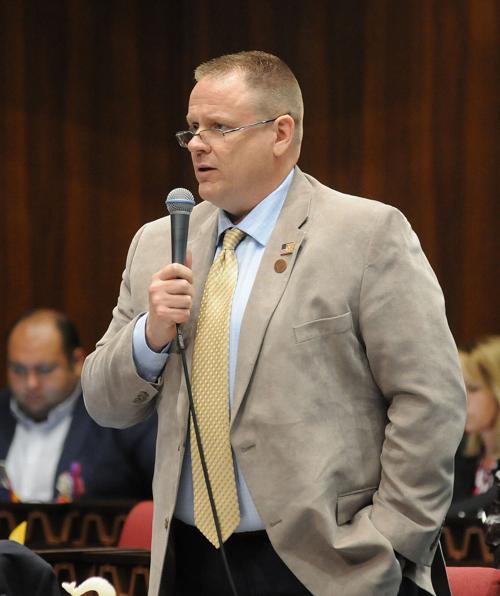PHOENIX — A second-term state lawmaker who fought unsuccessfully to change state rioting law has resigned.
Rep. Bret Roberts, R-Maricopa, said his last day as a legislator will be Sept. 30.
Roberts, who did not respond to multiple inquiries, gave no reason for his decision. But he later said in a Twitter post that it “was made merely on the basis that it is best for our family.’’
He told InMaricopa, an online news site, that the family will relocate out of state, though he declined to provide specifics.
Roberts represents District 11, including portions of Pinal County from Maricopa through parts of Casa Grande into Oracle, and then Marana and the Catalina Foothills in Pima County. The district is also represented by Rep. Mark Finchem, R-Oro Valley, and Sen. Vince Leach, R-Tucson.
But the replacement process involves only the Republican precinct committee workers in Pinal County, which has the larger share of the district’s population.
They have 21 days after the resignation is official to nominate three potential replacements, all of whom have to be a Republican like Roberts. The Pinal County supervisors get the last word.
The move came after Roberts was unable to get the Republican-controlled Legislature to approve his two highest-profile issues this year.
He crafted a measure to create a new crime of “violent or disorderly assembly.’’ It would have made it a felony if a person, acting with seven or more others, caused injury or property damage while engaging in a riot or an unlawful assembly, both already existing crimes.
Violation would have been a Class 6 felony, which carries a presumptive sentence of a year in state prison.
Roberts told Capitol Media Services at the time that he supports the First Amendment right to march and assemble. But he said protests haven’t always remained within those confines.
“It’s become the norm, any time something happens where people are upset, they think it’s OK to go out and destroy property and things of that nature, assault police officers and this kind of stuff,’’ said Roberts, a former constable.
He caused some alarm when he stated the measure was designed, at least in part, to convince people to stay away from some protests.
“This bill is intended to give individuals that choose to partake in what’s supposed to be peaceful protest to give them a moment of pause and ask themselves, ‘Do I want to attend this event? I need to ask myself, is there the potential that this could go awry and people’s livelihood and property may be in jeopardy?’ ‘’, at which point they could be subject to arrest.
Attorney William Knight testified against the bill.
“The sponsor just said his intent is to ‘give people pause,’ ‘’ he said. “So his intent is to chill people from engaging in protected speech.’’
Robert managed to get the measure out of the House with the bare minimum 31 votes but it was never brought to the full Senate.
A separate Roberts bill to make it a crime for business owners to turn away customers who did not provide proof of vaccination met a similar fate. The same measure would have allowed the government to shut down businesses for 30 days if they refused to serve unvaccinated customers.
Roberts said no one should be denied the right to shop because they refuse to disclose private medical information.
That bill also would have allowed employees to refuse demands by their bosses to get inoculated or risk getting fired.
It was defeated when Sen. T.J. Shope, R-Coolidge, aligned with all Senate Democrats to kill it. Shope, whose family owns a grocery store, called the measure government overreach.
“I believe in private property rights,’’ he said. “I believe in the rights of the sole proprietor, the barber who may be immunocompromised who cannot get a vaccine who would just want to put a sign up in the front of their shop.’’
Roberts, along with several GOP colleagues, also found himself on the receiving end of some comments in May by Dr. Cara Christ, then the state health director, who said statements by lawmakers doubting the need for and safety of the COVID-19 vaccine were hampering efforts by her agency to get more Arizonans inoculated.
Roberts had complained the vaccines had not, at that time, been approved by the federal Food and Drug Administration. He questioned the need for the vaccine, and criticized the alarm that he said “shut down the world economy.’’
“We don’t do it for hep C, we don’t do it for anything,’’ he asked. “Why should we do it now when this virus has a 99.8% survival rate and the average death (age) is like 72?’’





